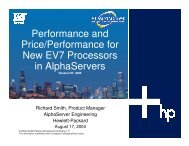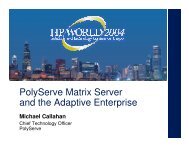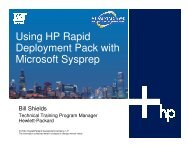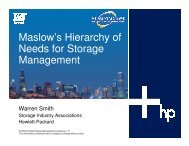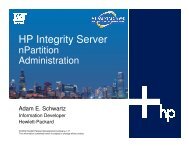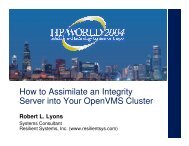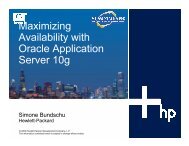Introduction to HP-UX Kernel Tuning - OpenMPE
Introduction to HP-UX Kernel Tuning - OpenMPE
Introduction to HP-UX Kernel Tuning - OpenMPE
Create successful ePaper yourself
Turn your PDF publications into a flip-book with our unique Google optimized e-Paper software.
<strong>Introduction</strong> <strong>to</strong> <strong>HP</strong>-<strong>UX</strong><br />
<strong>Kernel</strong> <strong>Tuning</strong><br />
Bill Hassell<br />
Direc<strong>to</strong>r of IT<br />
Systems and Methods, Inc.
<strong>Introduction</strong><br />
• What is kernel ‘tuning’?<br />
• Parameters and their effects<br />
• What tuning cannot do
Vocabulary<br />
• <strong>Kernel</strong> file<br />
−/stand/system (and /stand/build/system)<br />
− Tunable parameters<br />
− sysdef, kmtune<br />
• Measurement <strong>to</strong>ols<br />
−sar, vmstat, Glance
Parameter changing<br />
• SAM<br />
− easiest <strong>to</strong> use<br />
− built-in documentation<br />
− some bounds checking and interaction tests<br />
• Manual method<br />
− manual edit<br />
− no boundary checks
Filesystem Parameters<br />
• nfile, nflocks<br />
• ninode, vx_ncsize, ncdnode<br />
• bufpages, nbuf, dbc_max_pct,<br />
dbc_min_pct<br />
• maxfiles, maxfiles_lim<br />
• fs_async, default_disk_ir<br />
• disksort_seconds
nfile - max file opens<br />
• Maximum number of file opens<br />
− open counted for same files or different<br />
− min 3 per process<br />
•stdin<br />
•stdout<br />
•stderr<br />
•file: table is full<br />
6
nflocks - max file locks<br />
• Maximum number of open file locks<br />
• Highly application-dependent<br />
− one file may have several locks<br />
− Databases may need hundreds<br />
7
ninode - kernel inode cache<br />
• In-core cache of unique current and recent HFS<br />
inodes locations<br />
• Speeds reopens, multi-process file access<br />
• Keep small for typical databases, larger for<br />
development and NFS (HFS only)<br />
• ninode < nfile<br />
<br />
• Formula may be way <strong>to</strong>o large (vxfs)<br />
8
ncdnode<br />
• In-core cache of unique current and recent<br />
CDROM inodes<br />
• Speeds reopens, multi-process file access<br />
• Generally very small (one user for CDROM)<br />
• Copy CD’s <strong>to</strong> hard disk for multi-user access<br />
9
ufpages, nbuf, dbc_max_pct,<br />
dbc_min_pct - buffer cache<br />
• Buffercache similar <strong>to</strong> DOS SMARTDRV<br />
• used only with file access, not raw<br />
• nbuf non-zero not recommended<br />
• fix the cache with bufpages<br />
• range 200 Mb <strong>to</strong> 2 Gb (rd/wt ratio and CPU<br />
speed/qty)<br />
• Dynamic Buffer Cache min/max %<br />
10
maxfiles, maxfiles_lim<br />
• Single process file open limits<br />
• defaults <strong>to</strong> 60<br />
• soft limit, extend with setrlimit(2) up <strong>to</strong><br />
maxfiles_lim<br />
• POSIX shells: ulimit -f<br />
11
fs_async - sync policy<br />
• Async filesystem writes (inc. metadata)<br />
• 0 = safe for panics, powerfails<br />
• 1 = risky (filesystem corruption is likely) but can<br />
improve writes (only) by 30%<br />
12
default_disk_ir - immediate reporting<br />
• Disk Immediate Reporting - no wait for write <strong>to</strong><br />
complete<br />
• Similar <strong>to</strong> fs_async except applies <strong>to</strong> all disk writes<br />
including raw<br />
• <strong>Kernel</strong> param or scsictl by disk<br />
13
disksort_seconds<br />
• <strong>HP</strong>-<strong>UX</strong> gives priority <strong>to</strong> serial rd/wt<br />
• Intense serial I/O slows random I/O<br />
• Value <strong>to</strong> wait before changing priority<br />
14
Process Parameters<br />
• nproc, maxuprc<br />
• maxdsiz, maxdsiz_64bit<br />
• maxssiz, maxssiz_64bit<br />
• maxtsiz, maxtsiz_64bit
nproc, maxuprc - processes<br />
•nproc = max number of processes<br />
− proc: table is full<br />
•maxuprc = max processes per UID<br />
− collective UID processes, not per login<br />
16
maxdsiz - data segment<br />
• Maximum data segment size<br />
• Both default <strong>to</strong> 256 megs (was 64 megs)<br />
• Set <strong>to</strong> apx. 900 megs or 1750 megs<br />
• no kernel size penalty (just a fence for runaways)<br />
• maxdsiz could be 3.75Gb (SAM=2Gb)<br />
• maxdsiz_64bit max is 4 Tb<br />
• exec_magic notes (/usr/share/docs)<br />
• NOTE: maxdsiz_64 must be greater than maxdsiz<br />
17
maxssiz - stack size<br />
• Maximum stack size<br />
• runaway recursion can exceed<br />
• 79megs max for 10.20<br />
• 200megs max for 32 bit 11.xx kernels<br />
• maxssiz_64 = 1000megs max<br />
• FORTRAN arrays passed as data can easily<br />
exceed 200megs - use COMMON<br />
18
maxtsiz - text size<br />
• Unchanging executable instructions<br />
• Directly related <strong>to</strong> file size<br />
• Seldom needs changing unless a process has<br />
an exceptionally large number of instructions<br />
• 10.20:<br />
− 64 Mb default, 4 Gb max<br />
• 11.x:<br />
− 64 Mb default, 2 Gb max (32 bit)<br />
− 4 Tb max maxtsiz_64<br />
19
Network Parameters<br />
• Networking<br />
−nni<br />
• number of network interfaces<br />
• multiple LAN cards<br />
• SLIP/CSLIP/PPP interfaces<br />
−ndd<br />
• supported and unsupported values<br />
• commonly needed: dead gateway detection<br />
/etc/rc.config.d/nddconf<br />
TRANSPORT_NAME[0]=ip<br />
NDD_NAME[0]=ip_ire_gw_probe<br />
NDD_VALUE[0]=0<br />
20
Virtual Memory (swap)<br />
• maxswapchunks<br />
• swchunk<br />
• nswapdev, nswapfs<br />
• swapmem_on<br />
21
maxswapchunks, swchunk - Swap<br />
Space<br />
• Maximum addressing limits for swap<br />
• Usable swap is defined as:<br />
− maxswapchunks * swchunk * dev_bsize where: swchunk=2048<br />
and dev_bsize=1024<br />
• Leave swchunk <strong>to</strong> default<br />
• Formula simplifies <strong>to</strong>:<br />
− maxswapchunks=DESIRED-SWAP / 2097152 or<br />
− Maxswapchunks=DESIRED-SWAP / 2megs<br />
22
nswapdev, nswapfs<br />
• nswapdev - max number of swap devices<br />
• nswapfs - max number of filesystems that will be<br />
used for swap<br />
− filesystem swap performance<br />
− one way assignment policy (not returned)<br />
23
swapmem_on<br />
• <strong>HP</strong>-<strong>UX</strong> normally needs 1:1 RAM:swap<br />
•swapmem_on creates an overallocation policy,<br />
typically 75% of RAM<br />
• Can be used in both low RAM and high RAM<br />
systems<br />
24
swapmem_on<br />
RAM<br />
1 Gb<br />
SWAP<br />
500 meg<br />
swapmem_on=0<br />
Unusable for<br />
processes<br />
In this example, only 500 megs is usable<br />
for processes since Virtual Memory is<br />
only 500 megs.<br />
25
swapmem_on<br />
swapmem_on=0<br />
RAM<br />
1 Gb<br />
SWAP<br />
1 Gb<br />
In this example, 1 Gb is usable for<br />
processes since Virtual Memory is 1 Gb<br />
<strong>to</strong>o...but no paging needed<br />
26
swapmem_on<br />
RAM<br />
1 Gb<br />
SWAP<br />
500 meg<br />
swapmem_on=1<br />
Total<br />
Vmemory =<br />
1250 megs<br />
In this example, 1.25 Gb is usable<br />
for processes since Virtual<br />
Memory is 75% RAM + swap<br />
(750 + 500)<br />
27
Miscellaneous Parameters<br />
• Miscellaneous<br />
−timezone, dst (0,1,2,3 policy)<br />
−npty, nstrpty, nstrtel (SAM vs. insf)<br />
−timeslice<br />
• Non-parameters:<br />
−maxusers (pseudo/formula parameter)
Some last tips<br />
• Web help:<br />
<br />
http://docs.hp.com/hpux/onlinedocs/939/KCParms/<br />
KCparams.OverviewAll.html<br />
• SysAdmin Courses<br />
• SAM help (10.xx+)<br />
• Adjust carefully<br />
− Small changes<br />
− Few changes per sysgen
Co-produced by:




